Imagine a world where the simple act of eating not only nourishes your body but also contributes to a healthier planet and vibrant ecosystems. Welcome to the powerful paradigm of food as medicine, an approach that recognizes the profound impact of our dietary choices on our well-being and the world around us. For those of us who value sustainable living, ethical practices, and making a positive impact, understanding food as medicine offers a delicious pathway to personal vitality and environmental harmony. This isn’t just about following the latest health trends; it’s about reconnecting with the age-old wisdom that food possesses therapeutic properties and aligning our nutritional needs with the health of our planet. Join us as we delve into the fascinating world of food as medicine, exploring its historical roots, scientific foundations, diverse benefits, and practical applications for a healthier you and a thriving Earth.
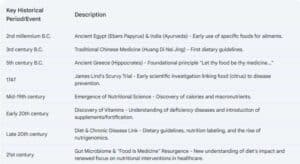
Ancient Wisdom for Modern Times: The Historical Roots of Food as Medicine and Sustainability
The concept of food as medicine isn’t a fleeting trend; it’s a deeply rooted practice found across cultures for millennia. Ancient civilizations like the Egyptians, with their documented use of foods in the Ebers Papyrus, and the founders of Ayurvedic and Traditional Chinese Medicine (TCM) placed food at the heart of health and well-being. Hippocrates, the “Father of Medicine,” famously said, “Let thy food be thy medicine and thy medicine be thy food”. These ancient systems often inherently considered the local environment and seasonal availability of foods, reflecting a sustainable approach to nourishment . By understanding these historical perspectives, we can appreciate that eating in harmony with nature and utilizing whole, locally sourced foods has long been recognized as vital for both individual and ecological health.
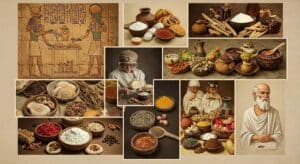
The Science of Nourishment: Macronutrients, Micronutrients, and Phytochemicals for a Healthy Body and Planet
Modern science continues to validate the wisdom of ancient traditions, revealing the intricate ways in which food impacts our health. Macronutrients (carbohydrates, proteins, fats) provide the energy and building blocks our bodies need, and choosing sustainably sourced options is crucial. For example, opting for plant-based proteins over resource-intensive animal agriculture can significantly reduce our environmental footprint. Micronutrients (vitamins and minerals) are essential for a vast array of bodily processes, and a diverse diet rich in whole, unprocessed foods, often locally grown, ensures we obtain these vital compounds. Furthermore, phytochemicals, bioactive compounds found in plants, offer significant health benefits beyond basic nutrition, acting as antioxidants and possessing anti-inflammatory properties. Embracing a “rainbow” of fruits and vegetables, grown with sustainable practices, not only benefits our health but also supports biodiversity.
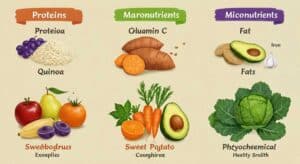
Food as Therapy: Addressing Health Conditions Through Sustainable Dietary Choices
The therapeutic potential of food is increasingly recognized in addressing various health conditions. Anti-inflammatory diets, rich in foods like fatty fish (sustainably sourced), olive oil, leafy greens, and berries (locally grown or foraged responsibly), can help manage chronic inflammation, a root cause of many diseases. For chronic conditions like cardiovascular disease, diabetes, and obesity, “Food Is Medicine” programs are gaining traction, emphasizing whole, nutritious foods. Choosing plant-based dietary patterns, when thoughtfully planned with an emphasis on local and seasonal ingredients, can be both health-promoting and environmentally friendly. Even our mental well-being is intricately linked to our diet through the gut-brain axis. Nourishing our bodies with nutrient-rich, sustainably sourced foods can positively impact our mood and cognitive function.

The Gut Microbiome: Cultivating Our Inner Ecosystem for Personal and Planetary Health
The trillions of microorganisms in our gut, known as the gut microbiome, play a pivotal role in our overall health, influencing digestion, immunity, and even mental well-being. Our dietary choices have a profound impact on this inner ecosystem. A diet rich in fiber from fruits, vegetables, and whole grains (ideally locally and sustainably produced), along with fermented foods, fosters a healthy and diverse microbiome. Interestingly, just as a diverse ecosystem is crucial for a healthy planet, a diverse gut microbiome is essential for our individual health . By choosing whole, unprocessed foods grown in healthy soil, we’re not only nourishing ourselves but also supporting a thriving inner ecosystem, which in turn can make us more resilient and less reliant on resource-intensive medical interventions.
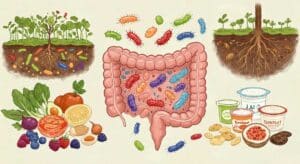
Global Food Wisdom: Sustainable Insights from Traditional Dietary Approaches
Exploring traditional dietary approaches like the Mediterranean diet, Ayurvedic medicine, and Traditional Chinese Medicine (TCM) reveals valuable insights into food as medicine that often align with sustainable practices. The Mediterranean diet, with its emphasis on plant-based foods, olive oil, and fish (when sustainably sourced), has well-documented health benefits and generally has a lower environmental impact than diets high in red meat. Ayurvedic medicine emphasizes personalized diets based on individual constitutions and the use of whole, seasonal foods. Traditional Chinese Medicine (TCM) focuses on the energetic properties of food and tailoring diets to promote balance and harmony with the seasons. These ancient systems highlight the importance of eating in harmony with nature’s cycles and utilizing locally available resources for optimal health.

Cultivating Health and Sustainability: Practical Steps for Your Food as Medicine Journey
Incorporating food as medicine into daily life while prioritizing sustainability involves conscious choices and mindful practices. Meal planning around seasonal, locally sourced ingredients helps ensure a nutrient-rich diet and reduces transportation emissions. Mindful eating encourages us to savor our food, improve digestion, and prevent overconsumption, minimizing food waste. Prioritizing healthy food preparation techniques like steaming and baking helps retain nutrients. Supporting local farmers and producers who employ sustainable practices strengthens your community and reduces the environmental impact of your food . Reducing food waste through proper storage and creative recipes not only saves resources but also ensures we’re making the most of nutrient-dense foods.
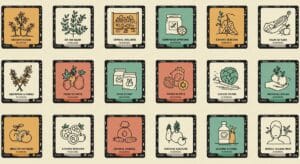
A Balanced Perspective: Recognizing Limitations and Embracing a Holistic Approach
While the benefits of food as medicine are significant, it’s crucial to maintain a balanced perspective. Food should complement, not replace, necessary medical treatments without professional guidance. The internet can be a source of misinformation, so relying on credible, evidence-based advice is essential. It’s also important to consider accessibility and cost, as sustainable and nutrient-dense foods may not be readily available or affordable for everyone. Furthermore, while focusing on food as medicine, we must acknowledge the broader determinants of health and well-being, including social, economic, and environmental factors. By taking a holistic approach and consulting with healthcare professionals, we can harness the power of food wisely and sustainably.
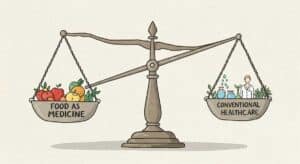
Conclusion: Embrace the Power of Nourishment for a Healthier Future
The journey of embracing food as medicine is a powerful one, offering a delicious pathway to vibrant personal health and a more sustainable world. By understanding the profound connection between what we eat and the well-being of ourselves and our planet, we can make informed choices that nourish both body and Earth. Let’s move beyond simply viewing food as fuel and recognize its inherent therapeutic potential and its impact on the delicate balance of our ecosystems.
- Start by incorporating one more serving of locally sourced, seasonal vegetables into your daily meals.
- Explore your local farmers’ markets and connect with the people who grow your food.
- Try one new recipe that utilizes food for its medicinal properties, like a turmeric latte for its anti-inflammatory benefits.
- Consider reducing your consumption of resource-intensive animal products and exploring more plant-based options.
- Share this knowledge with your friends and family and let’s cultivate a community that understands the power of food as medicine for a healthier future for all.

Strive To Be
Physically Strong … Mentally Awake … Environmentally Safe
Frequently Asked Questions About Sustainable Activewear
The core concept of “food as medicine” is that the food we consume has a profound impact on our health and well-being, extending beyond simply providing energy and nutrients. It recognizes that foods possess therapeutic properties that can actively contribute to preventing and managing diseases, promoting overall vitality, and supporting various bodily functions. This perspective shifts away from viewing food solely as sustenance and towards understanding its potential as a tool for maintaining and improving health.
The idea of food as medicine is not new but has deep roots in ancient civilizations worldwide. Ancient Egyptians documented the use of specific foods for ailments in the Ebers Papyrus. In India, Ayurvedic medicine has long emphasized diet as a cornerstone of health, focusing on balance and individual needs. Traditional Chinese Medicine developed dietary guidelines based on the energetic properties of food. In the West, Hippocrates famously stated, “Let thy food be thy medicine.” Over time, scientific advancements, such as Dr. James Lind’s scurvy trial, the discovery of macronutrients and vitamins, and the understanding of the gut microbiome, have provided scientific validation for this long-held belief, leading to the modern resurgence of the “Food Is Medicine” movement.
Food’s therapeutic potential stems from the interplay of several key nutritional components. Macronutrients (carbohydrates, proteins, and fats) provide energy and support essential functions like growth and repair. Micronutrients (vitamins and minerals), though needed in smaller amounts, are crucial for numerous physiological processes, and deficiencies can lead to disease. Phytochemicals (bioactive compounds in plants) offer additional health benefits through their antioxidant, anti-inflammatory, and other protective properties. The synergistic action of these components underlies how food can influence health and prevent illness.
Diet plays a significant role in managing inflammation, a key factor in many diseases. Consuming anti-inflammatory foods rich in omega-3 fatty acids, antioxidants, and specific compounds like curcumin in turmeric can help modulate the body’s inflammatory response. Conversely, diets high in processed foods, refined sugars, and unhealthy fats can promote inflammation. For chronic diseases like cardiovascular disease, diabetes, and obesity, “Food Is Medicine” approaches, including access to nutritious foods and specific dietary patterns like the Mediterranean and plant-based diets, have shown promise in improving health outcomes, reducing complications, and even reversing some conditions.
The link between diet and mental well-being is increasingly recognized through the gut-brain axis. Nutrient-rich foods, particularly those containing fiber, folate, antioxidants, Vitamin D, and magnesium, can positively influence mood, energy levels, and cognitive function. Limiting processed foods, sugar, and unhealthy fats is also crucial for supporting mental health. “Food as medicine” programs are exploring how targeted nutritional interventions can potentially improve mood, reduce stress, and enhance resilience in individuals facing mental health challenges. The health of the gut microbiome, heavily influenced by diet, also plays a significant role in mental health.
Numerous foods have been identified with specific health benefits supported by research. Berries, rich in antioxidants, may help prevent chronic diseases. Cruciferous vegetables contain compounds that may protect against cancer. Fatty fish, high in omega-3s, can reduce inflammation and support heart health. Turmeric and ginger possess anti-inflammatory properties. Green tea, rich in antioxidants, is linked to lower disease risk. Mushrooms may boost the immune system. These are just a few examples highlighting the diverse ways individual foods can contribute to overall health and well-being.
These traditional dietary approaches deeply integrate the concept of food as medicine. The Mediterranean diet emphasizes whole, unprocessed foods and healthy fats, associated with reduced chronic disease risk. Ayurvedic medicine focuses on personalized dietary recommendations based on individual body types (“doshas”), aiming to balance mind and body. Traditional Chinese Medicine utilizes the energetic properties and flavors of food to restore balance and support specific body functions, often tailored to the individual’s constitution and the seasons. These systems demonstrate a long-standing, culturally diverse understanding of food’s power to influence health.
While “food as medicine” offers significant benefits, it’s crucial to have a balanced perspective. It should not be seen as a cure-all, especially for acute or severe illnesses requiring conventional medical treatment. Misinformation online necessitates relying on credible sources and evidence-based advice. Potential drug-nutrient interactions highlight the importance of awareness and professional guidance. Accessibility and cost can also be barriers to adopting this approach for some individuals. Consulting healthcare professionals like doctors and registered dietitians before making significant dietary changes is strongly recommended to ensure food complements, rather than replaces, necessary medical care.




